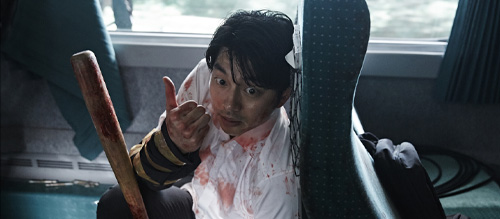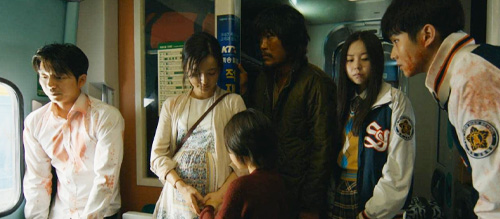Train to Busan (2016) Review
Train to Busan (2016)
Director: Yeon Sang-ho
Screenwriter: Yeon Sang-ho, Park Joo-suk
Starring: Gong Yoo, Jung Yu-mi, Ma Dong-seok, Choi Woo-shik, An So-hee, Kim Su-an,
Kim Eui-sung, Ye Soo-jung, Park Myung-shin, Shim Eun-kyung, Jang Hyuk-jin
Train to Busan is everything a zombie film should be: eerie, emotional and exhilarating. Director Yeon Sang-ho’s compelling debut live-action film is a masterclass in thrill and an undeniable contender for Genre Best that captures the essence of post-apocalyptic horror within the confines of a moving train. It frees itself from the limits of needless worldbuilding and uses ground zero of outbreak day to study its characters as they are flung into circumstances that only grow more dire.
Set in Seoul, South Korea, the story follows fund manager and distant father Seok-woo (Gong Yoo) as he accompanies his daughter Su-an (Kim Su-an) on a train ride to Busan, a city 3 hours away, amidst a quickly spreading zombie infection outbreak.
It is clear that Seok-woo is a work-obsessed and self-serving man, accentuated when he brings home a gift for his daughter that she points out he had already bought her once before. After some protest he agrees to take her to visit her mother in Busan to make up for it. But, as their train is about to leave, an “injured” woman jumps on board. Quickly, infection and chaos spread through the cabins with incredible aggressiveness.
Unlike the slow-moving walkers of ‘The Walking Dead’ (2010), Train to Busan’s infected are fast, strong and mindlessly determined to attack their next victims. They also add one of the genre’s scariest additions to zombie lore: the speed at which their infection spreads. The bitten turn in mere minutes, sometimes even seconds, dwindling the number of passengers and general public at an alarming rate.
Among Su-an and Seok-woo are working class man Sang-hwa (Ma Dong-seok) and his soon to be expecting wife, Sung-gyeong (Jung Yu-mi). Their loving dynamic and willingness to help those around them acts as a foil to Seok-woo’s selfish predisposition and pushes him to become a better man. They are joined by Jin-Hee (Sohee), a cheerleader infatuated with a baseball player, co-passenger Min Yong-guk (Choi Woo-shik), and Yon-Suk (Kim Eui-sung), who is a C.O.O. of a powerful company. The variety in character types come to portray the differences in reactions to chaos.
Train to Busan is as much a story about the corruption and greed of the higher classes as it is about zombies; it provides an observation rather than direct critique of selfishness. While its themes are universal, Train to Busan brings unique attention to South Korea and the prevalence of individualism in not only its citizens but their government. Yeon Sang-ho is no stranger to this type of observation having directed a number of critically acclaimed animated films prior, such as The King of Pigs (2011), The Fake (2013) and Seoul Station (2015), each of which deal with generational poverty, neglect of the homeless, and “what makes a person good or bad?”.
This question of morality hangs over Train to Busan too, which showcases that one’s goodness is based on the choices made. It doesn’t waste time with trying to explain all the ‘why’s’ of the apocalypse or finding a solution to every problem. Instead, it keeps the stakes ridiculously high and characters constantly in a reactionary state.

Yeon Sang-ho’s film has a uniqueness in its understanding of character motivation and humanity. It doesn’t commend anyone directly but instead presents the chain of events that surround an individual’s decision making for better or worse. The ideology that there are only good or bad choices, not people, is ever-present as the bonds between the train passengers evolve, change and/or regress throughout the duration of their journey.
Accompanying its existential elements, Train to Busan’s camerawork from cinematographer Lee Hyung-deok is exceptional, never leaving room to breathe. As was the case in Snowpiercer, another film set on a train and directed by a South Korean (Bong Joon-ho), every cramped, contained moment on the train is elevated by breathlessly choreographed action sequences and contrasted by establishing shots of vast landscapes that reinforce the isolation of their struggle. Yeon Sang-ho’s background in animation shines through here, especially in scenes where the infected are shown in numbers. Although terrifying, these sequences are spectacular.
Every character undergoes some sort of transformation, either becoming more selfless and survival-orientated or succumbing to the fear of their own morality and acting out of crude self-interest. The intensity of the survivors’ situation backs them into figurative and literal corners not often seen in Western zombie media (Resident Evil, World War Z), which often relies repetitively on big guns and brute cruelty to get out of tough spots. The passengers on the train to Busan work tirelessly to survive, and their successes are hard fought and often come with heavy sacrifice. While devastating, the uneven odds are a refreshing change from the brutal murders of the infected – seeing train cars filled with those who have fallen victim to the infection add a human dimension to them that is often lost. Despite being a lethal threat, these are hundreds of people that are no longer drivers of their own bodies, and Train to Busan lets the heartbreak of that reality sink in.
Following in the character-driven footsteps of 28 Days Later (2002), Train to Busan marks itself as a must-watch for not only zombie enthusiasts, but thrillseekers and horror aficionados alike. Zombie movies have had many iterations, introductions and elaborations, but Yeon Sang-Ho has been able to add a fresh new spirit, creating a jumping off point from which new stories can be told.
Score: 22/24
Written by Kae M.
Recommended for you: Top 10 Zombie Movies
You can support Kae M. on Twitter – @ultraman1312



Best zombies ever.